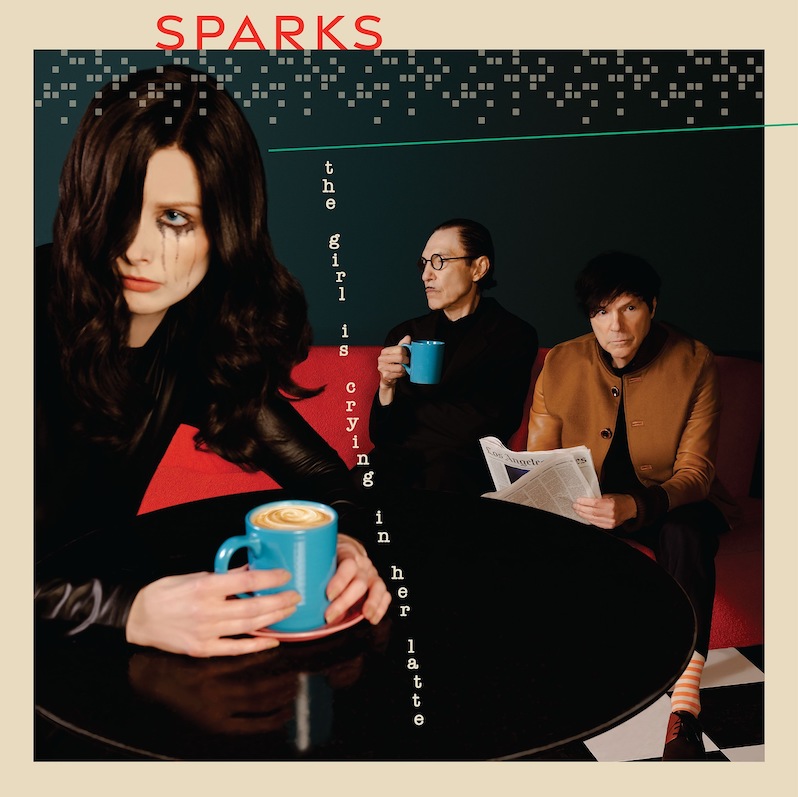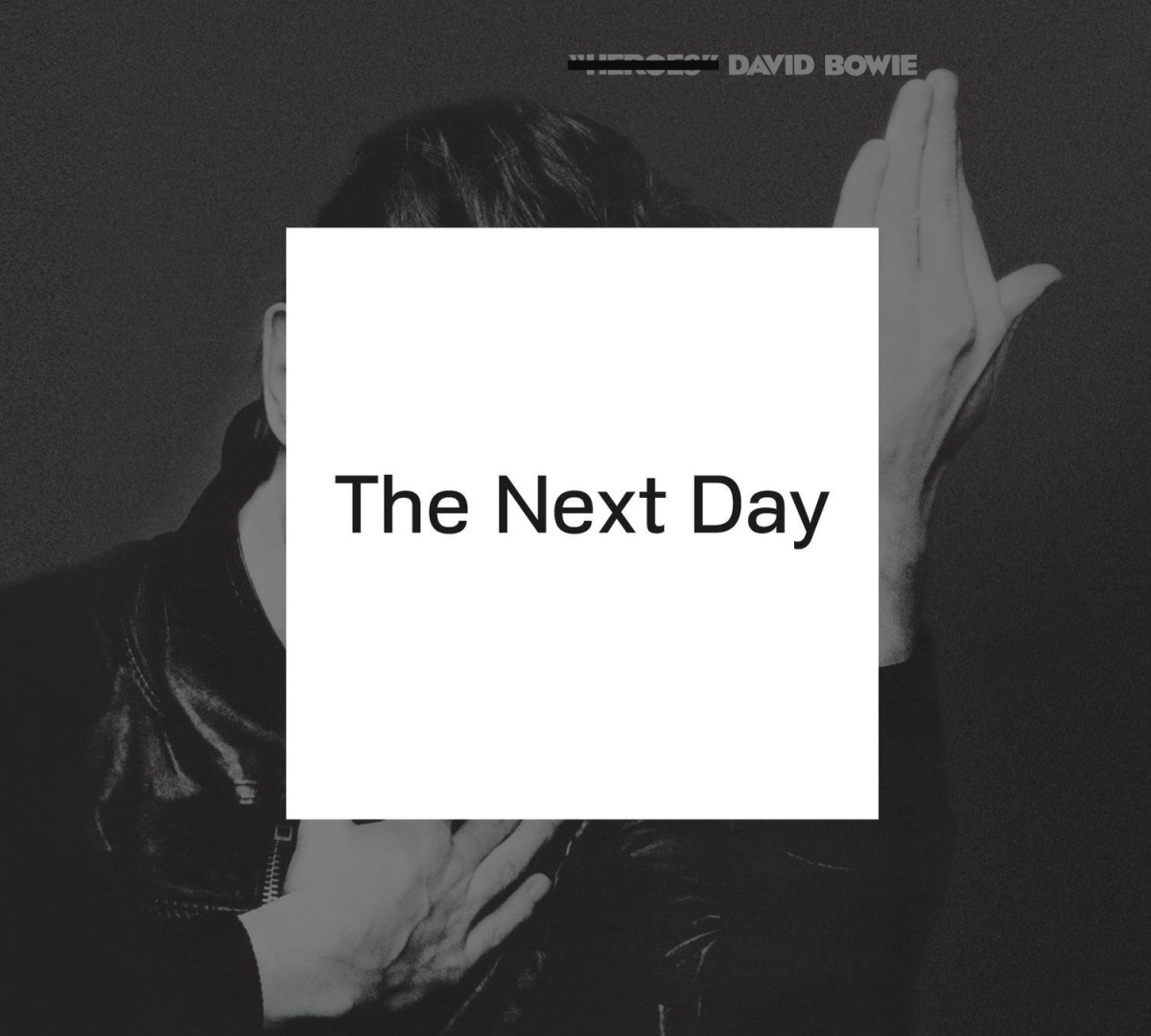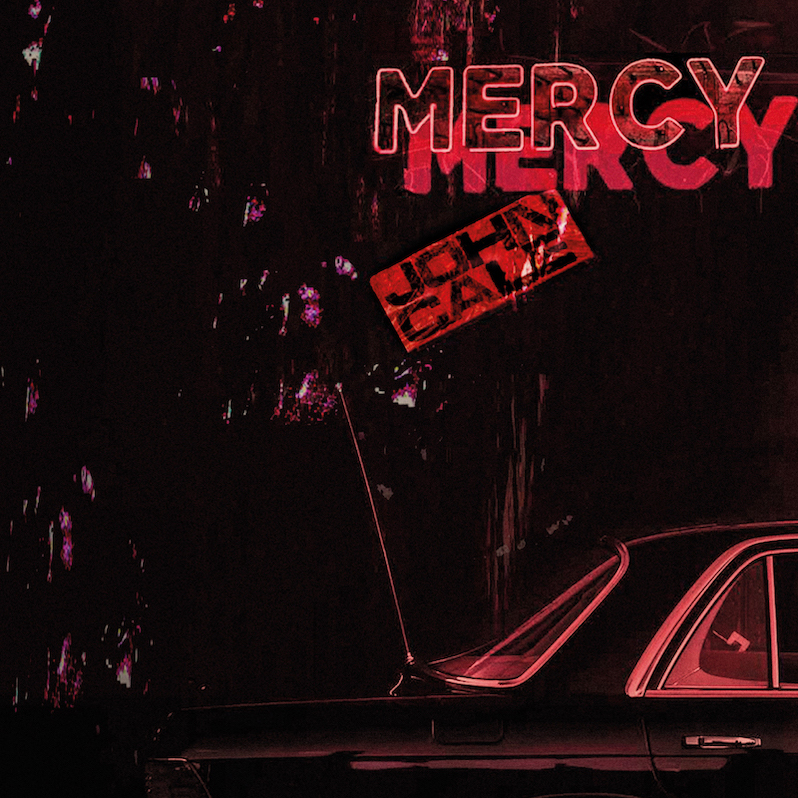Sparks – The Girl Is Crying In Her Latte

What’s most amazing about the Sparks revival of the last half-decade isn’t that they’ve been resetting popular music boundaries for half a freaking century. Well… all right, that’s pretty amazing. But what’s more remarkable about the Mael Brothers’ renaissance is how they’ve become so consistent: Musical audacity and lyrical deflation. (I’m heading out to trademark that. Don’t touch that T-shirt maker until I get back.)
Sparks’ constant changes in musical approach are now canon. They’re not contained by a reductive timeline, one that might read “glam to synth to new wave to synth again to neo-classical to…” you get the point. But ever since their ground-shifting 2002 album Lil’ Beethoven, Ron and Russell Mael—at least in their pop albums, if not their more ambitious media projects—have spun ricocheting musical styles with very literal storytelling.
Lyrics from Sparks over the last 20 years are mostly specific, verbatim and metaphor-free. Where Bruce Springsteen would say “Born to run,” the Maels would say “I think I’m breeding an escape mentality.” Where Pete Townshend would write about “Teenage wasteland,” the Mael brothers would write “You kids are spending way too much time on TikTok.” Where Lionel Richie would sing “You’re once, twice, three times a lady,” Sparks would say, “Gotta buy some drugs for this girlfriend of mine.”
That last line is a real Sparks lyric, from The Girl Is Crying In Her Latte, which is only their 26th album. Over Ron Mael’s foreboding, pulsating synth line peppered with dissonance, Russell Mael repetitively sings of his extremely focused mission: “Hold my place, I’ll be back in no time / Gotta buy some drugs for this girlfriend of mine.” The song’s title? “A Love Story.” That’s a typical Sparks move.
The new album drops as Sparks enjoy their highest level of visibility (at least in America) since 1974’s breakthrough Kimono My House, or at latest their modern rock hit “Cool Places” in 1983. An exhaustive but compelling documentary, The Sparks Brothers, scored new fans during its Netflix run. Annette, the movie musical by Sparks and Leos Carax, was uniquely original and polarizing. Their last two albums went Top 10 in Britain, and now that they’ve re-signed with Island Records, they can expect perkier marketing.
Even though Sparks are having a moment right now, they’re still gleefully making music without regard to past formulae and data points. The Girl Is Crying In Her Latte tells 14 stories with musical drama and unambiguous, almost simple lyrics. But while the stories the Maels tell are grounded in narrative, the number of interpretations one can draw from them is infinite.
For example, take “Veronica Lake.” Over Ron’s breaking-news synth pulses and patchy rhythms, Russell sings a story that is factually true. During World War II, there really was an effort to get the famously blonde actress Lake to cut her locks so admiring female workers on the B-29 assembly line wouldn’t get their hair snagged in the machinery. The feds got involved: “Now the government says, for goodness sake / Get a hold of this girl, Veronica Lake /And they beg her and plead, can you please make / Your hair slightly less like Veronica Lake.” She becomes a hero at great cost: “Yes, she killed her career, so much at stake / But we’re winning the war, now we’ve caught a break.”
The lyrics to “Veronica Lake” tell a linear story but offer a grab-bag of potential themes. The sneaky influence of pop culture in patriotism? The business cost of altering the familiar? Or the off-the-cuff sexism that runs underneath the industries of entertainment and war? Pick one or make up one of your own. That’s exactly how Sparks work.
Sparks’ first post-COVID album reflects new strains of awkwardness and casual disappointment. Certainly, the title track — its very name is awkward — skirts that notion in its minimalist, almost-viral video with Cate Blanchett dancing in a yellow suit and anxiety. The music, consisting of exactly one chord, features Ron’s tumbling, erratic synth riff evolving into a muffled-beat march straight out of Orwell’s Oceania. “Every day was the same / Tried to figure their game / They all ordered the same / Guess this world is to blame,” Russell sings as sad sacks advance through the Starbucks line. (Didn’t Alfonso Cuarón’s film adaptation of the dystopian Children of Men begin in an espresso joint?)
Many characters on the album are crumpled with unmet goals and profound letdowns. One of them, in “Nothing Is As Good As They Say It Is,” has figured out the inevitable: “All your standards must be so very low / This is not a place that I’d want to go.” By the way, the speaker is all of 22 hours old. But he’s seen all he needs and would like to head back to the womb: “I won’t ask any more from you / I can live with a lousy view.” Even classic art gets fed up in “The Mona Lisa’s Packing, Leaving Later Tonight”: “It’s now become impossible for her to smile / So she’s going to take her credit card and rack up miles.”
Those choosing to stick around look for affordable comforts in their sunken domains. The longing guy in “Escalator” keeps missing his chances with the woman who’s passing him on the way up (or down); it’s a futile fantasy, he decides. In “You Were Meant for Me,” he’s desperately hoping for a meet-cute at a French supermarket. She rebuffed him once, but “then your sweater caught my shopping cart, and you declared it must be due to fate.” Some folks will believe anything.
Even attempts to escape become disquieting. The white-collar couple in “Take Me for a Ride” can only decompress by role-playing Bonnie and Clyde in a speeding getaway car. Russell may see joy through binoculars in “It’s Sunny Today,” but his blasé singing over Philip Glass-like strings implies he’s still at odds with his psyche. “Gee, That Was Fun” closes the album with polite regret over a disintegrated romance—it’s not you, it’s him: “Should have spent less time watching sports / Should have improved my quick retorts / You were a bit too good for me / Didn’t take long ‘til you agreed.”
The characters who aren’t fatalistic or sheepish just don’t have time for your crap, like the baby in “Nothing Is As…”. “Not That Well-Defined” describes someone who doesn’t have a graspable point of view and prefers to float, resulting in a great backhanded compliment: “While you’re posing there with Claude Monet / As he finished you, he’d probably say, ‘Now, that is art!’” The party people in “When You Leave” enjoy driving an unwelcome guest paranoid: “They’ll be breaking out the X-Box when you leave / They’ll be breaking out the Courvoisier when you leave / They’ll be breaking out every Belgian beer when you leave / They can’t wait.” To his credit the target won’t budge: “I’m gonna stay just to annoy them / I’m gonna stay just to piss them off.”
TGICIHL’s silliest track, “We Go Dancing,” describes an EDM party in full swing — except it’s in North Korea, the music sounds more like a Wagnerian threat, and Kim Jong Un’s the DJ (“Skrillex, maybe Diplo, they’ve got nothing on our dude!”). Man, I hope Sparks dreamed it up as North Korea’s official state response to K-pop (“I got a baby who kills it in olive drab / She is what decadent Westerners might call fab”).
Running under all these cinematic short stories are Ron Mael’s gleaming, volatile arrangements. The 77-year-old still gets a kick from straight-up arena rock (“Nothing Is As Good As They Say It Is,” “It Doesn’t Have to Be That Way”). But the experimentation Lil’ Beethoven unleashed gets more compelling from album to album. Ron has no problem generating rhythm from white noise (“Veronica Lake”) or metal rhythm guitar riffs (“Take Me for a Ride”). When it’s called for, The Rhythm Thief will just dispose of percussion altogether (“It’s Sunny Today”) or dial it way down in the mix (“Escalator”).
Russell’s voice is Sparks’ sneakiest instrument. The songs demand a mannerism that he never forsakes; there’s no room for ad libs. But within those boundaries Russell serves the lyrics and temperament expertly, whether he’s wistful (“It’s Sunny Today”), menacing (“We Go Dancing”), or drolly objective (the title track).
Sparks has always brimmed with self-confidence, but TGICIHL overflows with it. Yes, its subtext is assuredly dark, but, well, this is Sparks. They traffic in bleak undertones, but they’re still entertainers from L.A. The Maels work off a comic filter that’s exclusively theirs. The humor isn’t zany or punchline-driven, but its satirical effect rivals Randy Newman’s. As befits the time, Sparks’ new work is recognition that things might be better if only we can get out of our own heads.
Then again, they might not. Want some biscotti with that latte?
Label: Island
Year: 2023
Similar Albums:
Paul Pearson is a writer, journalist, and interviewer who has written for Treble since 2013. His music writing has also appeared in The Seattle Times, The Stranger, The Olympian, and MSN Music.




